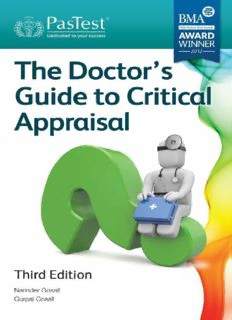
The Doctors Guide to Critical Appraisal PDF
Preview The Doctors Guide to Critical Appraisal
Dedicated to our son, Dilip, whose inquisitive nature reminds us that we should never stop asking questions. © 2012 PasTest Ltd Egerton Court Parkgate Estate Knutsford Cheshire WA16 8DX Telephone: 01565 752000 All rights reserved. No part of this publication may be reproduced, stored in a retrieval system, or transmitted, in any form or by any means, electronic, mechanical, photocopying, recording or otherwise without the prior permission of the copyright owner. First edition 2006, Second edition 2009, Third edition 2012 ISBN: 1 905635 818 ISBN: 978 1 905635 818 eISBN: 978 1 908185 846 A catalogue record for this book is available from the British Library. The information contained within this book was obtained by the authors from reliable sources. However, while every effort has been made to ensure its accuracy, no responsibility for loss, damage or injury occasioned to any person acting or refraining from action as a result of information contained herein can be accepted by the publisher or the authors. PasTest Revision Books and Intensive Courses PasTest has been established in the field of undergraduate and postgraduate medical education since 1972, providing revision books and intensive study courses for doctors preparing for their professional examinations. Books and courses are available for: Medical undergraduates, MRCGP, MRCP Parts 1 and 2, MRCPCH Parts 1 and 2, MRCS, MRCOG Parts 1 and 2, DRCOG, DCH, FRCA, Dentistry. For further details contact: PasTest, Freepost, Knutsford, Cheshire, WA16 7BR Tel: 01565 752000 Fax: 01565 650264 www.pastest.co.uk [email protected] Text prepared by Carnegie Book Production, Lancaster Printed and bound by CPI Group (UK) Ltd, Croydon, CR0 4YY About the authors Introduction to the third edition Acknowledgements SECTION A – EVIDENCE-BASED MEDICINE Introducing critical appraisal Formulating a question Search strategies The journal Organisation of the article SECTION B – APPRAISING THE METHODOLOGY Overview of methodology The clinical question Introducing study designs Observational descriptive studies Observational analytical studies Experimental studies Other types of study Research pathway Populations and samples Bias Confounding factors Restriction Matching Randomisation Concealed allocation The placebo effect Blinding Endpoints Validity Reliability SECTION C – INTERPRETING RESULTS Basic statistical terms Epidemiological data Intention-to-treat analysis Risks and odds Types of data Measuring data Data distributions Describing categorical data Describing normally distributed data Describing non-normally distributed data Inferring population results from samples Comparing samples – the null hypothesis Comparing samples – statistical tests Non-inferiority and equivalence trials Correlation and regression Systematic reviews and meta-analyses Heterogeneity and homogeneity Publication bias Interim analysis SECTION D – USING CHECKLISTS Introduction to checklists Aetiological studies Diagnostic or screening studies Treatment studies Prognostic studies Economic studies Qualitative research Guidelines SECTION E – APPLICABILITY The hierarchy of evidence Critical thinking SECTION F – CRITICAL APPRAISAL IN PRACTICE Health information resources Presenting at a journal club Taking part in an audit meeting Working with pharmaceutical representatives Further reading Answers to self-assessment exercises A final thought Index Dr Narinder Kaur Gosall BSc (Hons) PhD Director, Superego Cafe Limited Narinder Gosall studied in Liverpool and gained a PhD in neuropathology after investigating the role of the phrenic nerve in sudden infant death syndrome and intrauterine growth retardation. After working as a university lecturer she joined the pharmaceutical industry. She worked in a variety of roles, including as a Medical Liaison Executive and as a Clinical Effectiveness Consultant for Pfizer Limited. She has extensive experience in teaching critical appraisal skills to healthcare professionals and is an international speaker on the subject. She is the editor of the online course at www.criticalappraisal.com. Dr Gurpal Singh Gosall MA MB BChir MRCPsych Consultant General Adult Psychiatrist, Lancashire Care NHS Foundation Trust Director, Superego Cafe Limited Gurpal Gosall studied medicine at the University of Cambridge and Guy’s and St Thomas’s Hospitals, London. He worked as a Senior House Officer in Psychiatry in Leeds before taking up a post as Specialist Registrar in the North West. He now works as a Consultant Psychiatrist, looking after patients in the Psychiatric Intensive Care Units at the Royal Blackburn Hospital and Burnley General Hospital. He has a long-standing interest in teaching and runs a popular website for psychiatrists, Superego Cafe, at www.superego-cafe.com. Learning the skill of critical appraisal is like learning a foreign language – wherever you start, you come across unfamiliar words and concepts. However, persistence pays off and, like speaking a foreign language, the earlier it is mastered and the more it is used, the easier critical appraisal becomes. Critical appraisal skills are now as much a part of the clinician’s armoury as the ability to diagnose conditions and prescribe treatments. Critical appraisal skills allow clinicians to prioritise evidence that can improve outcomes. Such is the importance of acquiring these skills that critical appraisal is now routinely tested in medical, dental and nursing exams. We wrote the first edition of this book 6 years ago to explain critical appraisal to the busy clinician. Our aim has always been for the book to be the one-stop solution for all clinicians. Based on our teaching experience, we took a unique back-to-basics approach that provided a logical and comprehensive review of the subject. This new edition expands on the last edition with updated information, new chapters and more help with difficult topics. We hope that by reading this book you will start reading and appraising clinical papers with more confidence. The language of evidence-based medicine is not as foreign as you might think. NKG, GSG 2012
Description: